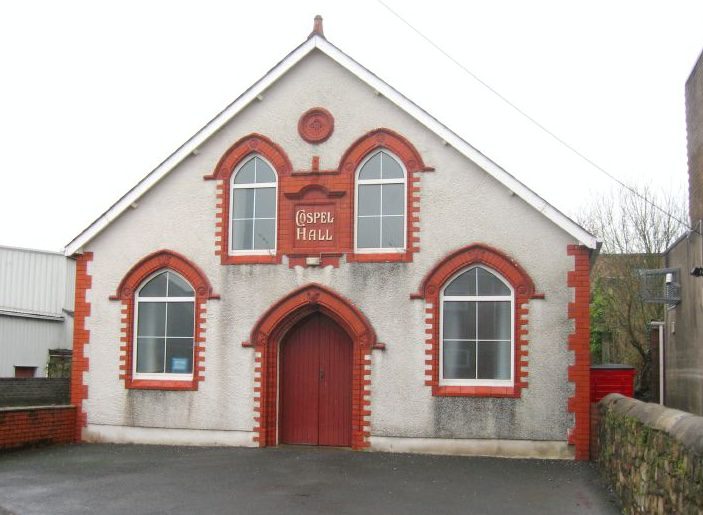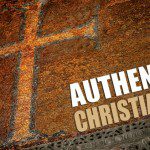How can we follow the Bible and not the traditions of men? Only by learning from other Christian groups.
Throughout church history there has been a tension between “the way things have always been done” and groups which seem new but are actually calling for a return to certain biblical principles. When God raises a new wave of such believers it is often with the intent of regaining something for the broader Church. Time after time in church history an enthusiastic movement is rejected initially by traditional christians. Over time the emerging group of churches so embodies a biblical value that is eventually adopted by a broader group than the community who recovered it.
But we are all too often blind to our own traditions, and so the best way for us to try to be truly biblical is to examine our teachings in light of the Bible but also in light of what other groups teach. My theological spectrum posts are an example of a call to try an aim for middle group in many issues.
Every local church would be wise to ask “what can we learn from other movements than our own?” If each local church is contending to be constantly reforming then the Church as a whole will be constantly being restored to the glorious bride Jesus desires her to be.
The Reformation itself is perhaps the prime example of this with Luther and Calvin and the movement they prompted recovering doctrines that have since been embraced by churches with no historical links to their communities. Indeed even the Roman Catholic Church itself adopted at least some of their values and, whilst differences remain, the open hostility towards the Protestants is no longer official Catholic church policy. But Luther and Calvin and their followers did not jettison all the traditions they had inherited.
Sometimes over time of course many denominations which were founded on a great move of God sadly drift into a new tradition and lose contact with the biblical values they were built on. Perhaps another group arrises proclaiming similar values but sadly they are often rejected by what has now become a traditional church. God is in the business of reforming his church. One of the cries of the church of my youth was to dare to believe for God to be at work Restoring his whole Church to his original plan, whilst also ensuring that things like music and the way we talk to each other are relevant and up to date.
The cry “back to the Bible” is not unique to the reformers but was heard before them and after them. Wycliffe and others predated Luther and Calvin, and regained the idea of the ordinary person being able to read the Bible in their own language.
The Reformation itself was all about recovering the doctrine of the justification by faith. But they were themselves blind to the newly forming baptist movement’s clear teaching that infant baptism also needed to be removed and replaced with baptism only of those who have already believed. The baptists also stressed that local congregations should be broadly independent rather than governed by rigid denominational structures. The pentecostals recovered gifts of the spirit. The charismatics built on the foundation of the Spirit’s power and regained a focus on vibrant worship which has spilled over into all kinds of churches today. That’s not to say that every church has adopted all of the above in full. But certainly the influence of each movement goes far beyond the bounds.
But what of the Brethren? What did they recover for the Church?
The Brethren began in 1830 in Plymouth, UK. They are not emphasised these days or in church history books. The movement later split into Open and Exclusive Brethren with the first group often called simply Brethren. Darby and George Müller are two of the most well known Brethren. For a while in the 1900s they were a thriving group of churches.
Over time many of the UK’s Brethren churches have morphed into regular Evangelical churches and are now often independent or form part of the FIEC here in the UK. Similar trends have probably happened in the USA and as a result many of us have forgotten the Brethren and in particular what they represented. A number of early charismatic leaders had been part of the Brethren, however. Perhaps as a result of these roots groups like Newfrontiers implemented several things that had first been seen in brethren assemblies, certainly these groups seem to have been influenced by them. But it is far from only charismatic churches that now follow many of the principles the Brethren restored.
As an aside, own grandfather, Edwin Millington Warnock is still fondly remembered among some older Christians in Suffolk for his work alongside many of the Brethren “Gospel Assemblies” which were set up in village after village. He would bring a tent, preach the gospel, and encourage converts to join these congregations. There was a season where there was quite a significant movement of God in that group of churches. My father grew up attending a Brethren church as did my mother. As a result I still have a number of relatives with living memory of the Brethren and some still attend congregations that began during that time, although their churches no longer identify as part of that movement.

I have found a history of the Brethren written in the 1970s online. The work of tent preachers like my Grandfather is mentioned:
As regards the British Isles, about 20 full-time evangelists go into villages with their tents and equipment, and hold Gospel Campaigns in places where there is no evangelical witness. They are supported by a trust known as “Counties Evangelistic Work”. Also ‘Mobile Units’ have been purchased by gifts from assemblies. These are vans equipped with loudspeakers and other suitable apparatus, for use in towns, mainly London, and manned by Gospel preachers that volunteer for open air preaching in the evenings after their daily work.
https://brethrenonline.org/home/articles/the-brethren-since-1870/
The Counties Evangelists still exist today and a few years ago I did a training day for them, the videos are at the end of this article.
The Brethren were actually a radical movement and spoke about the need for the Holy Spirit to edify the body of Christ not solely through a single Pastor:
‘This, I doubt not, is the mind of God concerning us, that we should come together in all simplicity as disciples, not waiting on any pulpit or ministry, but trusting the Lord will edify us together by ministering to us, as He sees good, from ourselves.’
M‘Culloch, J. (1908–1926). Brethren (Plymouth). In J. Hastings, J. A. Selbie, & L. H. Gray (Eds.), Encyclopædia of Religion and Ethics (Vol. 2, p. 843). T. & T. Clark; Charles Scribner’s Sons.
This belief undergirded a number of crucial things which as far as I can tell were almost entirely lost among other churches when the Brethren came on the scene. But most of these things are now rather common among many other evangelical churches. Not everywhere, but many would now see these values as a given, and most would have no idea that it was the Brethren that recovered these values. I’m not saying of course that none of these values were ever recovered independently of the Brethren but that they as a movement embodied them and made them seem “normal” for some others to follow.
What the Brethern regained for us
- Plurality of elders / Team ministry with more than one leader. Before the Brethren churches were almost always led by one pastor. This idea seems to have caught on far and wide. As far as I can tell it originated with the Brethren. Today few evangelical churches will now be lead by a single pastor even if they are smaller.
- Open worship These services were times when people would start a song or share a word as they felt the Spirit led. This was being done before the charismatics spoke about a similar model as practising spiritual gifts. To be clear the brethren did not call this prophecy or words of knowledge, being theologically cessationist as everyone was at the time they were founded.
- Body ministry where all Christians are meant to do the work of ministry, not a select few. Ephesians 4 was used as the foundation for this idea that the job of the leaders in church is not to do everything but to equip others. Baptism, serving communion, preaching, prayer were all delegated to members of the congregation rather than solely the role of a priestly class of pastors. In pentecostal and charismatic circles we have adopted the idea of body ministry but if we are honest there has been a constant pull towards the big ministry of an “anointed man of God” who often lacks real accountability and does the most important work of ministry. One has to wonder if we were consistently more likely the Brethren on this point would our leaders be less likely o fall into sexual sin or spiritual abuse?
- Stressing that the congregation is the church NOT the building. The brethren had no sense of their buildings. being sacred or consecrated places. They taught that biblically the word ecclesia referred to a gathering or assembly of followers of Jesus. As a result they refused to call the buildings they met in churches, talking instead about “Gospel Halls” or “Assembly halls”. This has definitely rubbed off on many other churches. For example charismatic churches met in homes, schools, pubs, restaurants, cinemas, community halls, and later warehouses, basscially wherever they could find a big enough space. Many of the early charismatic churches didn’t even use the word church preferring to refer to their congregations as a “Fellowship” a word very similar in origin to the Brethren’s “Assembly”. Even today when many of those groups have build meeting places they will typically refer to them as something other than a church. For example Hope Church Ipswich meets in their own building which they call the Hope Centre. But even among churches which do still refer to their buildings as churches such as many Baptist Churches, most will now have much less reverence for the building itself and stress in their teachings they believe that the real church is a people not a building. This belief seems to have been first recovered by the Brethren..
As far as I can tell all those things were recovered by the Brethren. If any church history experts out their are aware of groups preceding the Brethren that followed any of these principles I would of course be interested to hear of them.
Here is a good example of early Brethren teaching
In the Church, which is His body, Christ the Head has given certain gifts for the edification, or building up, of the whole body of believers. These gifts are evangelists, pastors and teachers (Eph. 4′:8-16). These are recognized in and discharge their ministry in and with the fellowship of the local assemblies. Then also there are bishops, or elders, and deacons in these churches, as for example in Philippi (Phil. 1:1). There is no mention whatsoever of one man in charge, to whom the assembly delegated the task of teaching, preaching and shepherding. There is no such term as “the pastor of a church” or “the teacher, or preacher of a church.” The word is always in the plural, except where the requirements and responsibility of their work is described. . .
It cannot be emphasized sufficiently that scriptural principles of gathering require scriptural power — the Holy Spirit–for their operation. When that power is absent, confusion follows; but it is not the principles that have failed, but the people. Once the people of God are restored in heart, the power will once more be apparent. The principles, being scriptural, are always true and right. Let us not adjust the principles of God’s word to our form of gathering but our form of gathering to the principles found in the good Book. . .
The abominable heresy that divides the church of God into two classes, called the “clergy” and the “laity,” is utterly unknown in the New Testament. This did not come into existence until the latter part of the second century, as a perusal of any reliable ‘Church History” will prove. This innovation was undoubtedly the work of the Devil, and it has wrought untold havoc in the church of God. The word “clergy” comes from the word “kleeros,” which is translated, “heritage.” In I Peter 5:3 the Spirit of God declares that all believers are God’s “kleeros,” or heritage. The term “laity” comes from the word “laos,” which means “the common people.”
In Christendom today we hear of “clergymen and laymen,” or the “kleeros and the laos.” The clergyman belongs to a particular class in the Church who, by reason of education along certain religious lines, plus human ordination, has authority conferred upon him to preach, baptize, administer the elements in the Lord’s supper, and also lead the congregation in public worship, prayer and ministry, as well as shepherd the flock. The layman, not being so educated and ordained, has no such privileges, and must be content to occupy a subordinate place. This detestable heresy finds its fullest expression in the Roman Catholic Church, but Protestantism also, is greatly corrupted by it.
There is not the slightest ground for this division of Christians in the New Testament. You will search therein in vain for it. It is foreign to the whole language of Scripture in which every believer is viewed as a “priest” (I Peter 2: 5-9). As such he is exhorted to “offer up spiritual sacrifices, acceptable to God by Jesus Christ” (I Peter 2: 5) . All God’s people are described as being constituted a kingdom of priests unto God (Rev. 1: 5, 6; 5: 10) . All are invited to draw near with a true heart, in full assurance of faith, through “the great high Priest of their confession,” whose blood has opened up the new and living way into God’s presence and favor (Heb. 10: 19-22).
The elaborate ritual of Judaism, with its special priesthood, was done away in Christ! The veil has been rent, and every regenerated person has been constituted a priest unto God. All enlightened Christians will acknowledge this, yet many continue to maintain their membership in a system which both recognizes and supports this multitude of unscriptural “reverends,” “right reverends,” etc., etc. Inasmuch as the church of God is likened to a human body, each part being necessary for the proper functioning of the whole; there can therefore be no division of the body into two separate bodies or classes, such as is practiced in most circles of denominationalism.
Among those known as “brethren,” no such distinctions are tolerated for one moment. As they meet as an assembly for worship or prayer, all the believers occupy the same common ground of priesthood, and liberty is given to the Spirit of God to express Himself audibly through any of the men so gathered, the women being expressly enjoined to be “silent in the churches” (I Cor. 14: 34, 35). (emphasis added)
Alfred Grips, 1935 Scriptural Principles of Gathering.https://brethrenonline.org/home/articles/scriptural-principles-of-gathering/
Read More
My evangelism training at the Counties Evangelists (four videos)














